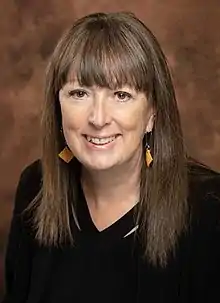Charlene Bearhead
Charlene Bearhead is an educator and Indigenous education advocate. She was the first educational lead for the University of Manitoba's National Centre for Truth and Reconciliation.[1]

Personal life
Bearhead grew-up in Drayton valley, Alberta.[2] She is a mother, grandmother, and educator with decades of experience in the educator sector.[3]
Career
She received a degree in education from the University of Alberta in 1985. Bearhead holds teaching certificates for both Alberta and Manitoba. She has taught for Parkland School Division and Calgary School District in Alberta and St. Vital School Division in Manitoba. She was principal of Paul First Nation School and has served as superintendent of education for the Paul First Nation. She founded Mother Earth's Children's Charter School in Wabamun in 2003 and served as its first principal. Bearhead helped establish an Aboriginal Circle program and developed a Youth Cultural Reconciliation Special Project for public schools in Edmonton. She also served as interim education director for the Alexander First Nation.[4]
She led negotiation of the First Nations and Inuit Child Care Initiative on behalf of Treaty 6, Treaty 7, Treaty 8 Alberta as well as Ontario. She led the establishment of the Early Childhood Services division for the Alberta regional office of the First Nations and Inuit Health Branch of Health Canada.

Alongside Sylvia Smith, Bearhead was the national coordinator for Project of Heart, which was tasked with educating Canadians on the history and legacy of residential schools.[5] From 2015 to 2017, Bearhead was the education coordinator for the National Centre for Truth and Reconciliation at the University of Manitoba.[6] She subsequently was named education coordinator for the National Inquiry into Murdered and Missing Indigenous Women and Girls.[7][3]
Bearhead was the education adviser for the Canadian Geographic Indigenous Peoples Atlas of Canada project.[8]
References
- "Conversations about well being". The Learning Exchange.
- "Acknowledging a dark part of our past". Drayton Valley Western Review. 2014-06-30. Retrieved 2018-10-23.
- "Charlene Bearhead Journey Participant". Canada C3.
- "List of Presenters" (PDF). Algoma University.
- "Projects of the heart at PNE give expression to Indian residential school tragedies | Vancouver Observer". www.vancouverobserver.com. Retrieved 2018-10-23.
- "Charlene Bearhead galvanizes educators to move from 'apology to action'". CBC News. September 11, 2016.
- "Charlene Bearhead on the role of education in truth and reconciliation". Canadian Geographic. February 16, 2017.
- "New Indigenous atlas to grace libraries, classrooms across Canada | CBC News". CBC. Retrieved 2018-10-23.